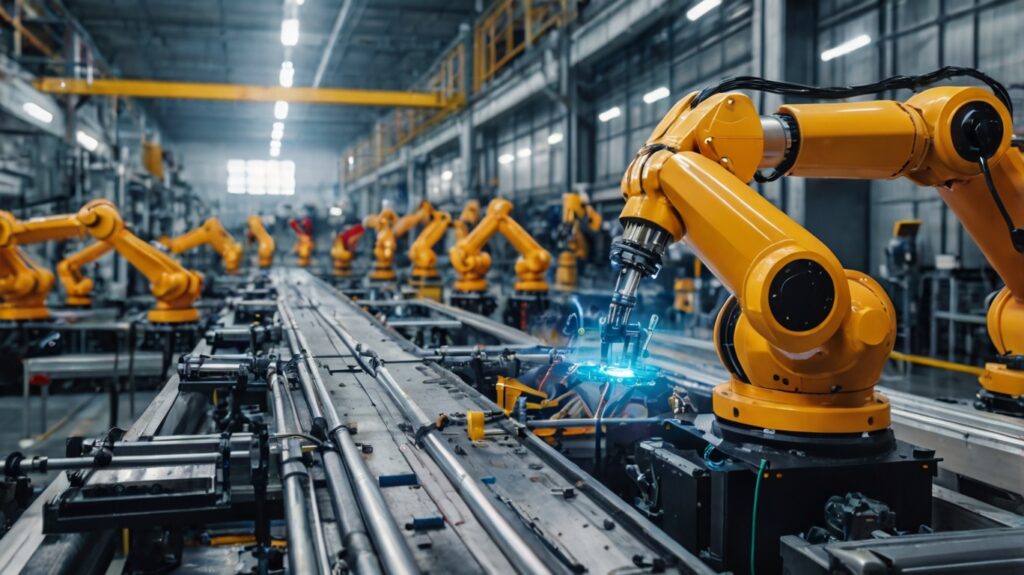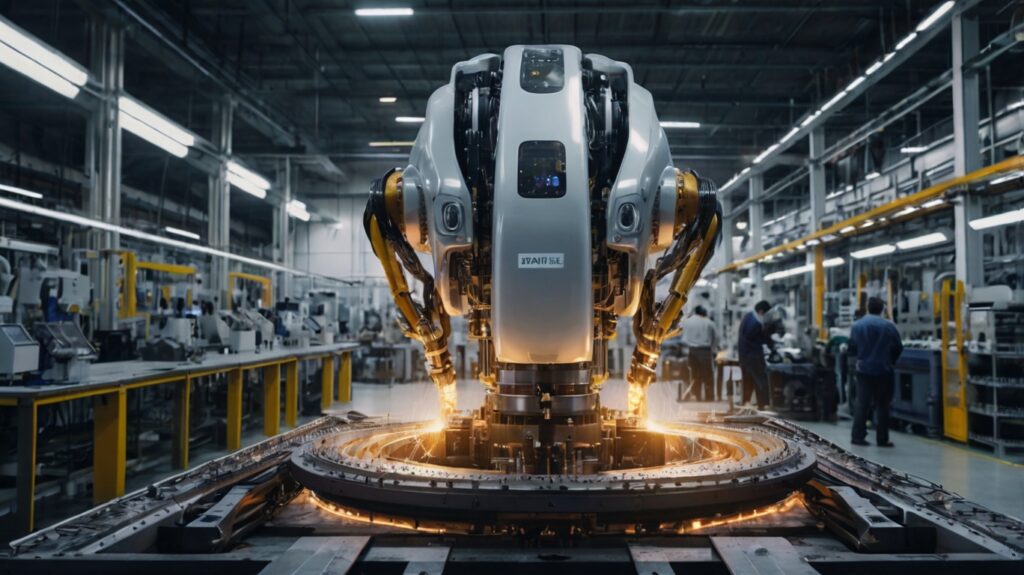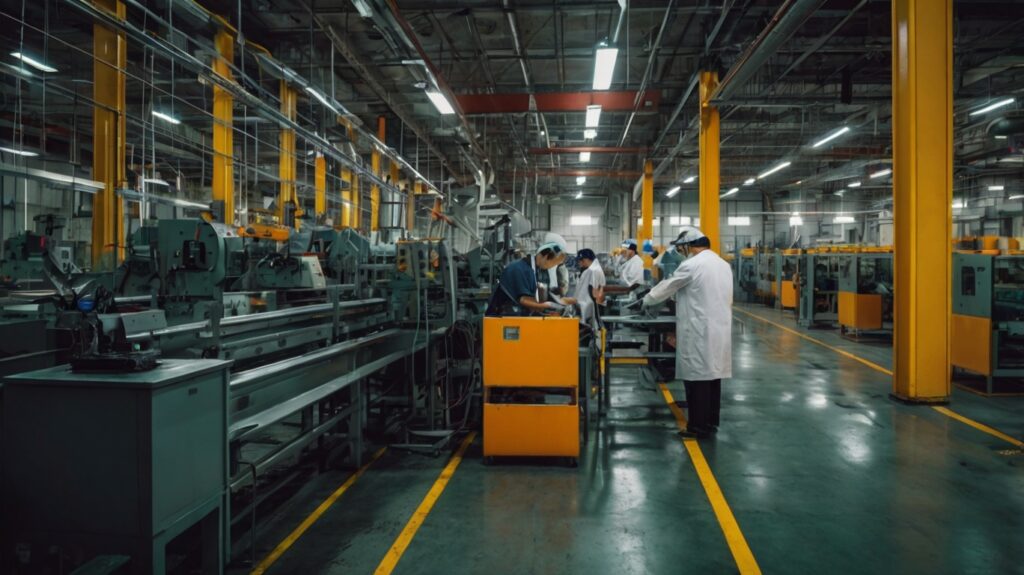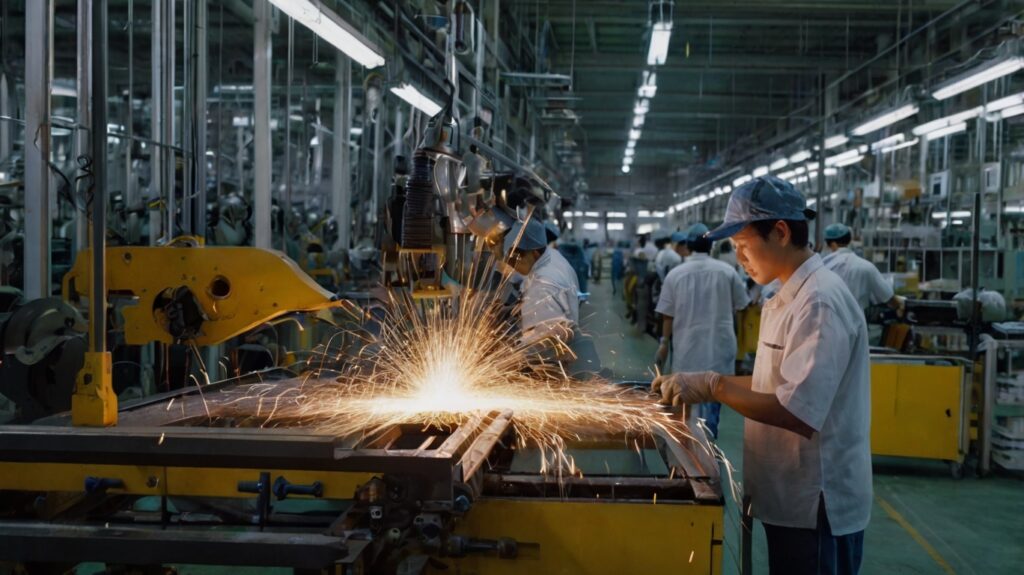The manufacturing industry is on the cusp of a revolution. No longer is it just about efficient production lines and assembly processes. The rise of Artificial Intelligence (AI) is transforming every aspect of manufacturing, from design and production to supply chain management and quality control. This blog post will delve into the role of AI for manufacturing and explore some of the most impactful use cases that are shaping the future of this critical sector.

Table of Contents
ToggleWhy AI for Manufacturing?
The manufacturing industry faces a multitude of challenges. Globalization has intensified competition, demanding ever-increasing efficiency and cost reduction. Consumers are becoming more discerning, demanding high-quality, customized products at competitive prices. Additionally, there’s a growing pressure to adopt sustainable practices and minimize environmental impact.
AI offers a powerful solution to these challenges. By crunching vast amounts of data from sensors, machines, and historical records, AI can identify patterns, predict outcomes, and automate tasks with unprecedented accuracy. This translates into a range of benefits for manufacturers, including:
Increased productivity
AI can optimize production processes, minimize downtime, and improve resource allocation, leading to significant production boosts.
Enhanced quality control
AI-powered vision systems can detect defects with superhuman accuracy, ensuring consistent product quality.
Predictive maintenance
AI can analyze sensor data to predict equipment failures before they occur, allowing for proactive maintenance and preventing costly downtime.
Improved supply chain management
AI can optimize inventory levels, forecast demand, and streamline logistics, leading to a more efficient and responsive supply chain.
Product design and innovation
AI can analyze vast sets of data to generate innovative product designs, optimize materials usage, and personalize products to meet specific customer needs.

Sustainability
AI can help manufacturers optimize energy consumption, reduce waste generation, and identify opportunities for environmentally friendly production methods.
Transforming the Manufacturing Landscape: Use Cases for AI
The potential applications of AI in manufacturing are vast and ever-evolving. Here are some of the most impactful use cases that are already transforming the industry:
Predictive Maintenance
Traditional maintenance schedules are often reactive, leading to unexpected equipment failures and production disruptions. AI-powered predictive maintenance flips the script. By analyzing sensor data from machines, including vibration, temperature, and energy consumption, AI can identify early warning signs of potential failures. This allows for proactive maintenance, minimizing downtime and extending equipment lifespan. For instance, GE Aviation uses AI to analyze sensor data from jet engines to predict maintenance needs, reducing unplanned downtime by 50%.
Machine Vision and Defect Detection
Human inspectors are prone to fatigue and can miss subtle defects. AI-powered vision systems equipped with deep learning algorithms can analyze high-resolution images at lightning speed, detecting even the most minute flaws in products. This ensures consistent product quality and reduces the risk of defective products reaching customers. Companies like Siemens are using AI-powered vision systems to inspect car bodies on the assembly line, achieving a 99% accuracy rate in defect detection.
Robotic Process Automation (RPA)
Repetitive tasks on the factory floor can be tedious, error-prone, and a drain on human resources. RPA powered by AI automates these tasks, freeing up human workers for more complex activities. This can involve tasks like material handling, machine tending, and quality control checks. For example, Foxconn, a major electronics manufacturer, has implemented RPA to automate repetitive tasks in their production lines, resulting in a 30% reduction in labor costs.

Demand Forecasting and Inventory Management
Accurately forecasting demand is crucial for manufacturers to avoid stockouts or overstocking. AI can analyze historical sales data, market trends, and social media sentiment to predict future demand with remarkable accuracy. This allows manufacturers to optimize inventory levels, reduce storage costs, and ensure they have the right materials on hand to meet customer needs. Companies like P&G are using AI-powered demand forecasting to achieve a 95% accuracy rate, leading to significant reductions in inventory holding costs.
Production Optimization and Scheduling
Manufacturing processes involve complex workflows and scheduling considerations. AI can analyze production data, identify bottlenecks, and optimize production schedules to maximize efficiency and throughput. This can involve optimizing machine utilization, scheduling maintenance activities, and dynamically adjusting production plans based on real-time data. For example, Honeywell uses AI to optimize production scheduling in its aerospace manufacturing plants, resulting in a 20% increase in production output.
Challenges and Considerations for AI in Manufacturing
While the potential benefits of AI for manufacturing are substantial, there are also challenges that need to be addressed to fully unlock its potential. Here are some key considerations:
Data Security and Privacy
The effective use of AI relies on vast amounts of data. Manufacturers need to ensure robust data security measures are in place to protect sensitive information and comply with data privacy regulations.

Talent and Skills Gap
As AI transforms manufacturing processes, the skillsets required for workers will evolve. Manufacturers need to invest in training programs to equip their workforce with the skills needed to work effectively alongside AI systems.
Explainability and Transparency
AI algorithms can be complex, making it challenging to understand how they arrive at decisions. Manufacturers need to ensure a level of explainability and transparency in their AI systems to build trust with human workers and regulators.
Ethical Considerations
As AI takes on a greater role in manufacturing, ethical considerations arise. Manufacturers need to ensure their AI systems are unbiased and do not perpetuate discrimination or unfair labor practices.
Conclusion
The rise of AI in manufacturing does not signal the end of human jobs. Instead, it represents a shift towards a more collaborative future. AI will handle the repetitive and data-driven tasks, freeing up human workers to focus on higher-level activities such as innovation, problem-solving, and strategic decision making. The human-AI partnership will be critical for driving efficiency, quality, and sustainable practices in the manufacturing sector.
Here are some additional insights for manufacturers looking to embrace AI
Start Small and Scale Up
Don’t try to overhaul your entire operation overnight. Identify a specific area where AI can add value and start with a pilot project. Once you’ve demonstrated success, you can scale up your AI initiatives.
Invest in the Right Talent
Building a team with expertise in AI, data science, and manufacturing will be crucial for success. Partner with AI solution providers who understand the specific challenges of the manufacturing industry.

Focus on Continuous Learning
The field of AI is constantly evolving. Manufacturers need to have a culture of continuous learning to stay ahead of the curve and adapt their AI strategies as new technologies emerge.
By embracing AI and fostering a collaborative human-AI workforce, manufacturers can unlock a new era of productivity, innovation, and sustainable growth. The future of manufacturing is bright, and AI is poised to play a pivotal role in shaping this exciting new landscape.
FAQs (Frequently Asked Questions)
AI is not likely to replace human workers entirely, but it will automate repetitive tasks. This will free up human workers to focus on higher-level activities that require creativity, problem-solving, and strategic thinking. The future of manufacturing will likely involve a more collaborative human-AI workforce.
Some of the biggest challenges include:
- Data security and privacy: Ensuring robust data security measures are in place to protect sensitive information.
- Talent and skills gap: Equipping the workforce with the skills needed to work effectively alongside AI systems.
- Explainability and transparency: Ensuring AI systems are understandable and transparent to build trust.
- Ethical considerations: Addressing potential biases in AI algorithms and ensuring ethical labor practices.
- Start small and scale up: Identify a specific area where AI can add value and start with a pilot project.
- Invest in the right talent: Build a team with expertise in AI, data science, and manufacturing. Partner with AI solution providers with industry knowledge.
- Focus on continuous learning: Stay up-to-date on the latest AI advancements and adapt your strategies as new technologies emerge.
- Increased productivity and efficiency
- Enhanced quality control
- Predictive maintenance
- Improved supply chain management
- Product design and innovation
- Sustainable manufacturing practices
- Predictive maintenance: Analyzing sensor data to predict equipment failures before they occur.
- Machine vision and defect detection: Using AI-powered vision systems to detect defects in products with high accuracy.
- Robotic process automation (RPA): Automating repetitive tasks on the factory floor, freeing up human workers for more complex activities.
- Demand forecasting and inventory management: Predicting future demand with accuracy to optimize inventory levels.
- Production optimization and scheduling: Analyzing production data to identify bottlenecks and optimize production schedules for efficiency.
